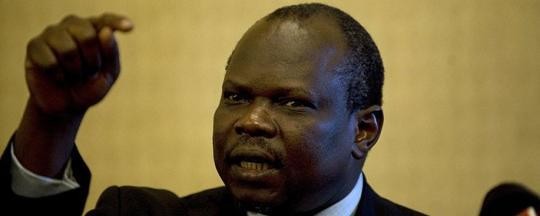The former Secretary-General of the SPLM Pagan Amum Okich has accused Kampala and Khartoum of plotting to overthrow the Sudan People’s Liberation Movement from government in South Sudan.
In an interview with El Jareeda newspaper, the head of the SPLM ‘Former Detainees’ faction said Sudan and Uganda have influenced the political process of South Sudan in order to serve their own interests.
“It was a mistake when the South Sudanese government and opposition faction asked for help from Kampala and Khartoum,” he said, referring to Ugandan support for the SPLM-Juba faction and Sudanese support for the SPLM-IO faction.
He pointed out that the Sudanese government tried several times to curtail the sovereignty of the world’s youngest nation by taking the advantage of what he termed “poor leadership.”
The politician pointed out that the Khartoum government is currently supporting the two parties to the conflict in order to prolong the crisis.
Pagan Amum blamed President Salva Kiir for instigating the ongoing crisis in South Sudan. He added that the conflict erupted after President Kiir started to move away from the vision of the SPLM party.
“The problem worsened when President Salva Kiir refused to make any review of the performance of the ruling party – he resorted to security solutions by mobilizing irregular forces,” Amum was quoted as saying.
He further said the way forward is through formation of a transitional government that will restore security and the confidence to the people of South Sudan.
Pagan pointed out that President Salva Kiir and his former deputy Riek Machar are the ones responsible for putting an end to the conflict and then returning to work as partners.
“If this option is not possible then they should go out together and leave the responsibility to others,” he challenged.
He also claimed also that he had narrowly survived several assassination attempts before and after his detention in Juba in December last year. He attributed his survival to some elements within the SPLA army and security agents who protected him and other colleagues.
This statement echoes remarks that he made earlier during his testimony in his own defense at his treason trial in April 2014. The treason charge was dropped.




